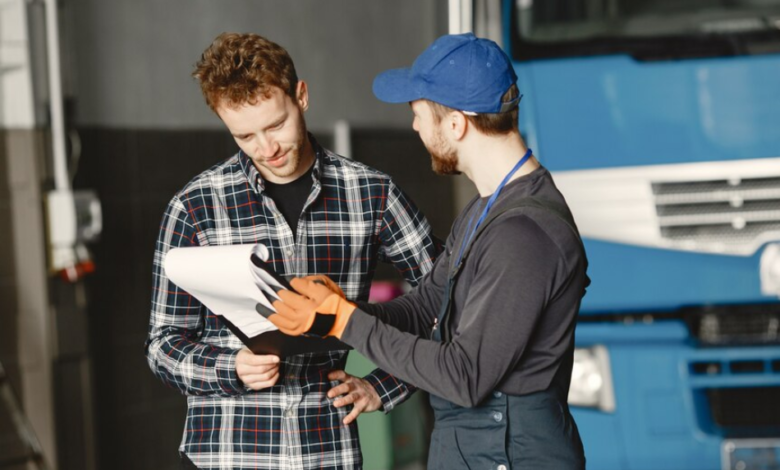Exploring the Role of Automation in Road Haulage Logistics

The furtherance in the sector of automation is resulting in several significant changes in the industry of logistics and the industry of road haulage. The system of automation has made progress in the efficiency, economy, and safety of carrying various goods through the use of new technologies.
The operations of logistics are changing. This is a result of many developments that included robotic systems for warehouses, various autonomous trucks for the roads, and well-informed telematics that is having route optimisation. Various autonomous cars can work without the participation of human beings.
Technologies like devices of IoT and various prognostic analytics help businesses to make better and real-time decisions when it comes to logistics.
This blog post will make contributions to the different levels of conversations about the analyzable role that automation plays in the road haulage logistics, as well as all of its advantages and disadvantages.
What Is Meant By Automation In Road Haulage Logistics?
Automation in road haulage logistics is meant by the use of various progressive technologies for the carrying and transporting different goods and services. This works to enhance the efficiency of performance, cost-effectiveness, and safety of the process.
Autonomous vehicles: The vehicles in road haulage automation are those various self-driving vehicles that get the support of AI and different sensors to transport various goods without any engagement of humans.
Optimisation of route: Real-time data and a variety of algorithms are also added to the road haulage logistics process to optimise routes. These make an impact on the vehicles of roads to work best for delivering the items.
Warehouse and Loading Automation: The automation in warehousing and loading for road haulage logistics works with automated systems and robots for streamlining, storing, handling, loading and unloading of goods.
Fleet management and telematics: Fleet management and telematics in road haulage are added with the use of technologies to optimise and verify the dealings of the vehicles. This is done by the use of analytics for performance, real-time tracking, and maintaining the scheduling.
Internet of Things (IoT): In road haulage automation the Internet of Things or IoT works with various devices and sensors to collect real-time data about the conditions of the vehicles and cargo.
Block-chain technology: In road haulage logistics block-chain technology provides clear, secure, and attributable details of the transactions and records about the shipments.
Predictive Analytics and Big Data: Big data and predictive analytics in logistics and road haulage work on using the progressive level of different algorithms and forecast the demand and improve efficiency with the optimal level of route planning.
Electronic Logging Devices (ELDs): Electronic Logging Devices or ELDs in road haulage logistics work on automatic assessment and record-keeping of the hours of driving. They do this to make sure about the compliance with the regulations between the servicing hours.
Challenges And Considerations Of Automation In Road Haulage
Challenges of automation in road haulage are added with high levels of initial costs, concerns of job displacement, complexities in regulations, risk of cyber security etc.
High level of initial investment: Working with automation in road haulage needs direct investment for various technologies like autonomous vehicles, warehouse automation, and systems of telematics. This creates significant financial challenges for various businesses.
Job Displacement and Workforce Impact: The use of automation in road haulage can result in job displacements for the various logistic personnel and drivers.
A regular level of legal issues: Various legal issues related to the use of road haulage automation are added with the rules for autonomous vehicles, concerns of liability in situations of accidents, and laws for the privacy of data.
Risks of cyber security: The use of automation in road haulage can lead to the risk of cyber theft and misuse of private data.
Technical challenges: The technical difficulties in ensuring the dependability of automated car systems and incorporating new technologies arise when it comes to road haulage automation.
Public and Stakeholder Acceptance: The challenges in the stakeholder’s and public acceptance of road haulage automation are needed to address the concerns of safety and social impacts.
Ethical and Social Considerations: Ethical and social considerations in road haulage are added with the addressing of the loss of jobs and ensuring the fair treatment with the jobless and displaced workers. The challenges also occur while balancing the advancements of technologies.
Challenges in operations: Challenges in operations related to the automation of road haulage are added to the security of the system’s reliability with the updating and maintaining of the technology.
Flexibility and scalability: The challenges in the scalability and flexibility of road haulage automation are linked to the adoption of the process of automation for the changes in the business needs. This is also connected to the management of the different categories of demands of commerce.
Growing emissions: The use of automation in road haulage logistics is also becoming the reason for the growing emissions in the environment.
Benefits Of Automation In Road Haulage
Automation in road haulage works with the enhancement of efficiency in operations, reduction in costs, and improvement in safety with the emergence of 24/7 working operations.
Increase in work efficiency: In the road haulage industry, automation improves productivity and simplifies corporate processes. This optimises the routes and decreases the amount of manual labour.
Reduction of cost: The use of automation in road haulage reduces the cost of operations by decreasing the expenses on the labours, making optimal usage of fuels, and reducing the cost of maintenance.
Safety improvement: The use of automation in road haulage logistics work for safety improvement. This is done by reducing human errors and adding an advanced level of assistance system for the drivers.
Enhancement in customer satisfaction: The use of automation in road haulage also results in the enhancement of customer satisfaction and increase in the performance of the business.
Environmental Benefits: The usage of automation in road haulage logistics results in environmental benefits. This is done by optimising the routes and reducing fuel consumption and GHG emissions.
Better Inventory Management: Automation in road haulage results in better inventory management. This is done by the use of real-time data and inclination of IoT.
Regulatory Compliance: The use of road haulage automation ensures regulatory compliance. This is done by the use of ELDs or electronic logging devices. The ELDs are used for automated safety cheques and record-keeping.
Scalability: The ability to increase operational efficiency and accommodate varying demand levels are linked to the scalability of automation management for road haulage. Additionally, they strive for the smooth integration of new technology while proper optimisation of available resources.
Enhancement in the use of data: Road haulage automation uses the latest developments in IoT devices and analytics to improve data utilisation. They collect the business’s real-time insights in this way.
Recruitment In The Age of Automation
Hiring practices for road haulage automation must prioritise digital skills, staying updated with technology, encouraging lifelong learning, and striking a balance between automated and human system proficiency.
Emphasising transferable skills: In the era of automation, it is important to emphasise transferable abilities. This makes it possible for the labourers and staff to comprehend how technology functions in road haulage.They also help people become resilient and make changes easier across different industries.
Promoting upskilling and reskilling: In the age of automation the promotion of upskilling and reskilling is very important. This makes sure that the employees are adopting the new competencies of work.
Fostering partnerships with educational institutions: The automation also helps to foster new partnerships with different educational institutions. This is done to enhance the knowledge of new technology among the employees by training from educational institutions in road haulage logistics.
Highlighting innovation and career growth: The promotion of a new creative culture and an ongoing learning process among employees goes hand in hand with the emphasis on innovations and career advancement. Road transport businesses now have more opportunities as a result.
Advancing Safety In Transport Through Automation
With the introduction of new technology like autonomous vehicles, which will have real-time monitoring systems, the process of road haulage has become more advanced and progressive.
Driver assistance systems: The technologies known as driver assistance systems or DAS, are made to run vehicles more safely and efficiently for road haulage operations.
Elimination of Human Error: The idea of eliminating human mistake is associated with technology that lessens the inefficiencies caused by human behaviour. Reducing human error is crucial in a variety of businesses, including road haulage logistics.
Advanced Sensor Systems: The technologies that use sensors to gather and store a variety of real-time driving and environmental data are referred to as advanced sensor systems. They are essential to many diverse uses across a range of industries, including road haulage and logistics.
Predictive algorithms: The computer models that use previous and current data to forecast the future are known as predictive algorithms. Utilising this in the logistics of autonomous road transport is crucial.
Connected Vehicles and Infrastructure (V2X): The communicative ecosystem cars or V2V, infrastructure or V21, and other entities or V2N are referred to as connected vehicles and infrastructure (V2X). Through the use of various wireless communication technologies, they exchange a variety of information regarding road haulage automation.
Emergency Response and Incident Management:In the context of road haulage, incident management and emergency response refer to a coordinated approach that leverages technology to identify and handle a range of situations.
Wrapping Up
In summary, it can be said that automation and its application have transformed road haulage and logistics. It has improved the supply chain’s sustainability, efficiency, and safety. They deal with advanced sensors, V2X communication, predictive algorithms, and autonomous cars.
Automation technologies are reducing costs and improving fleet management through efficient route planning.
However, there are certain drawbacks to the road haulage automation adoption as well, such as higher upfront costs and worries about job displacement.
Notwithstanding the difficulties, they offer advantages including improved safety, less environmental impact, and efficient automation utilisation.
As industries continue to work with various innovations, these technologies are making a balance in technical advancement, regulatory compliance, and societal acceptance into road haulage logistics.



